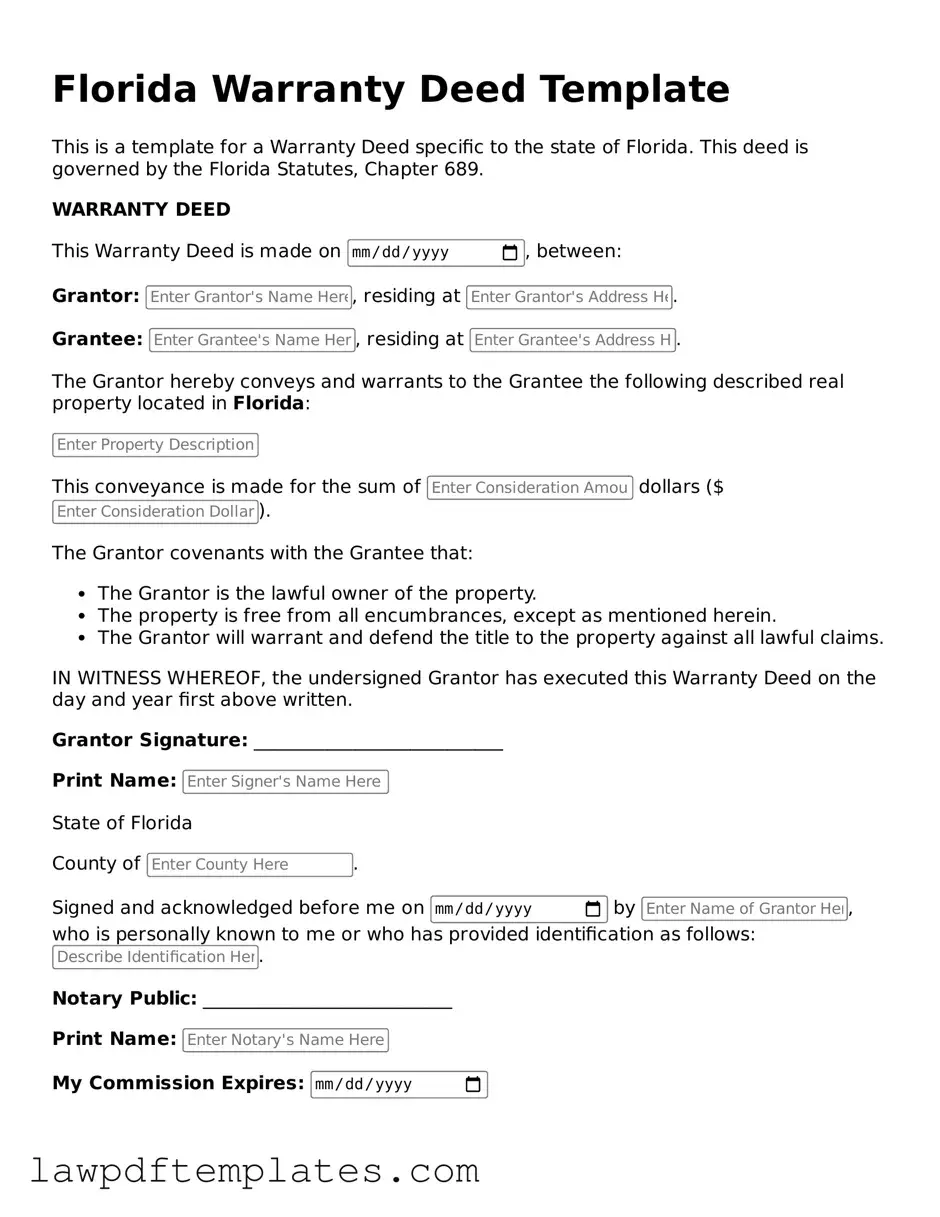Free Deed Template for the State of Florida
Form Breakdown
| Fact Name | Description |
|---|---|
| Definition | A Florida Deed form is a legal document used to transfer ownership of real estate in Florida. |
| Types of Deeds | Common types include Warranty Deed, Quitclaim Deed, and Special Warranty Deed. |
| Governing Laws | The Florida Statutes, particularly Chapter 689, govern the execution and recording of deeds. |
| Execution Requirements | The deed must be signed by the grantor and two witnesses to be valid. |
| Notarization | While notarization is not required for all deeds, it is highly recommended for added authenticity. |
| Recording | To protect the interests of the grantee, the deed should be recorded in the county where the property is located. |
| Transfer Tax | Florida imposes a documentary stamp tax on the transfer of real property, which must be paid at the time of recording. |
| Legal Description | A complete legal description of the property must be included in the deed to ensure clarity of the transfer. |
| Grantee's Information | The deed must clearly identify the grantee, including their full name and address. |
| Importance of Accuracy | Errors or omissions in the deed can lead to disputes or challenges in ownership, making accuracy crucial. |
Sample - Florida Deed Form
Florida Warranty Deed Template
This is a template for a Warranty Deed specific to the state of Florida. This deed is governed by the Florida Statutes, Chapter 689.
WARRANTY DEED
This Warranty Deed is made on , between:
Grantor: , residing at .
Grantee: , residing at .
The Grantor hereby conveys and warrants to the Grantee the following described real property located in Florida:
This conveyance is made for the sum of dollars ($).
The Grantor covenants with the Grantee that:
- The Grantor is the lawful owner of the property.
- The property is free from all encumbrances, except as mentioned herein.
- The Grantor will warrant and defend the title to the property against all lawful claims.
IN WITNESS WHEREOF, the undersigned Grantor has executed this Warranty Deed on the day and year first above written.
Grantor Signature: ___________________________
Print Name:
State of Florida
County of .
Signed and acknowledged before me on by , who is personally known to me or who has provided identification as follows: .
Notary Public: ___________________________
Print Name:
My Commission Expires:
Common mistakes
Filling out a Florida Deed form can seem straightforward, but many individuals encounter pitfalls that can lead to significant issues down the line. One common mistake is failing to include the correct legal description of the property. This description should be precise and detailed, often found in the original property deed. Omitting or inaccurately describing the property can result in legal disputes or complications in the transfer of ownership.
Another frequent error is neglecting to properly identify the grantor and grantee. The grantor is the person transferring the property, while the grantee is the person receiving it. If the names are misspelled or if there are inaccuracies in their identification, it can create confusion and potentially invalidate the deed. Always double-check names and ensure they match official identification documents.
Many people also overlook the importance of notarization. In Florida, a deed must be signed in the presence of a notary public to be legally binding. Failing to have the deed notarized can lead to complications in property transfers and may render the deed unenforceable. It’s crucial to ensure that all signatures are properly witnessed and notarized before submitting the document.
Additionally, individuals often forget to include the appropriate consideration amount. This amount represents the value exchanged for the property. Leaving this section blank or entering an incorrect figure can raise questions about the transaction's legitimacy. It’s essential to provide accurate and truthful information regarding consideration to avoid future disputes.
Lastly, many individuals do not take the time to review the entire deed before submission. Errors can easily slip through the cracks, and a thorough review can catch mistakes that might otherwise go unnoticed. Taking the time to read through the document carefully can save significant headaches and legal issues later on. Always ensure that every detail is accurate and complete before finalizing the deed.
Discover More Deed Templates for Specific States
Michigan Deed Forms - Prior deeds should be reviewed to verify ownership history.
The importance of having a reliable effective Power of Attorney strategy cannot be overstated, as it provides a framework for ensuring that your choices are honored when you are unable to express them yourself. It serves as a critical tool for navigating various aspects of personal affairs and legal responsibilities.
How Do I Get My Deed to My House - A deed can include special provisions, like granting easements or rights of way.
Property Transfer Form - Is usually created by a licensed attorney or real estate professional.
